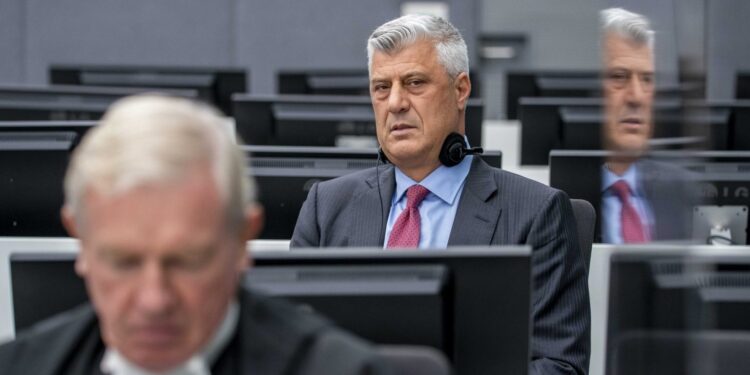On April 3, 2023, the trial of the former president of Kosovo, Hashim Thaçi, will begin at the Kosovo Tribunal in The Hague (officially the Kosovo Specialist Chambers ), where he has been charged with war crimes and crimes against humanity.
Prosecutors in July said they hold Thaçi responsible for nearly 100 murders of civilians during the 1998-99 war and some months thereafter when he was a Kosovo Liberation Army (KLA) commander who fought the Serbian police and the Yugoslav army.
In addition to Thaçi, three other former leaders of the KLA will be placed on trial. All four men have repeatedly pleaded not guilty. They are being accused of overseeing illegal detention facilities where the movement’s opponents were kept in inhumane conditions, tortured, and sometimes killed.
Thaçi and his co-accused have been in detention since most of them surrendered in 2020 after the Kosovo Specialist Chambers confirmed their indictment.
The Kosovo Tribunal consists officially of the Kosovo Specialists Chambers and the Specialist Prosecutor’s Office. It was established as the result of an international agreement ratified by the Kosovo Assembly, a constitutional amendment and the law on Kosovo Specialist Chambers and Specialist Prosecutor’s Office to deal with the atrocities that occurred in and after the war. The court is in The Hague in the Netherlands and staffed by internationals.
ALSO READ: New marathon international trial in The Hague?
Thaçi, a national hero to many Kosovars and supported by the United States, began his political career after leading the KLA’s battle against forces under late Serbian President Slobodan Milošević. He became the first prime minister in 2008 and was elected president in 2016. Ties with the administration of U.S. President Donald Trump deepened in September when Kosovo and Serbia signed an economic relations deal at the White House. He resigned on November 5 2020 and surrendered to the Tribunal shortly afterwards.
In Kosovo, there was and continues to be anger, as many oppose the war crimes court and see the KLA commanders as heroes.
This year marks 25 years since the Kosovo War occurred in 1998 and 1999. The armed conflict was with the Serbian police and the Yugoslav army due to ethnic and political tensions between the Albanian majority and the Serbian minority in Kosovo, which was, at the time, a province in the Republic of Serbia within the Federal Republic of Yugoslavia. Kosovo officially declared independence in 2008 and Serbia has refused to recognize Kosovo’s sovereignty.







